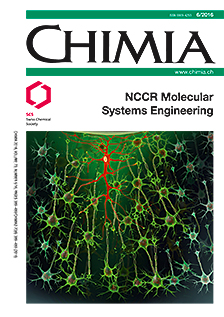Engineering and Assembly of Protein Modules into Functional Molecular Systems
DOI:
https://doi.org/10.2533/chimia.2016.398Keywords:
Membrane protein, Molecular systems engineering, Nanofactory, Protein engineering, Synthetic biologyAbstract
Synthetic biology approaches range from the introduction of unique features into organisms to the assembly of isolated biomacromolecules or synthetic building blocks into artificial biological systems with biomimetic or completely novel functionalities. Simple molecular systems can be based on containers on the nanoscale that are equipped with tailored functional modules for various applications in healthcare, industry or biological and medical research. The concept, or vision, of assembling native or engineered proteins and/or synthetic components as functional modules into molecular systems is discussed. The main focus is laid on the engineering of energizing modules generating chemical energy, transport modules using this energy to translocate molecules between compartments of a molecular system, and catalytic modules (bio-)chemically processing the molecules. Further key aspects of this discourse are possible approaches for the assembly of simple nanofactories and their applications in biotechnology and medical health.Downloads
Published
2016-06-29
Issue
Section
Scientific Articles
License
Copyright (c) 2016 Swiss Chemical Society

This work is licensed under a Creative Commons Attribution-NonCommercial 4.0 International License.
How to Cite
[1]
S. Hirschi, M. Stauffer, D. Harder, D. J. Müller, W. Meier, D. Fotiadis, Chimia 2016, 70, 398, DOI: 10.2533/chimia.2016.398.







